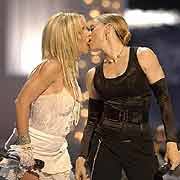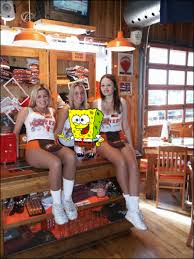Literal-Minded Parents Seek Irony-Free School Zones
by Con Chapman
TYSONS CORNER, Virginia. This booming suburb is situated on a watershed point between two clashing American subcultures; conservative Southern Baptists, many of whom have ancestors who were “f.f.v's”—members of the first families of Virginia, and newcomers drawn here by information economy jobs in high-tech or government.
Home in Tysons Corner.
“I don't cotton much to some of the johnnie-come-lately's we're getting around here,” says Graham Buchter, whose ancestors grew tobacco back when it was literally used as currency here. “They're a bunch of talkers—they wear me out.”

Buchter: “Give your damn mouth a rest, would you?”
Mr. Buchter and his wife send their three children to the local public school, but with more than a little trepidation. “They come home all sassy,” says Virginia Buchter. “Those new kids put a lot of silly ideas in their heads from their MTV and whatnot. It takes me a half hour to settle them down to do their homework.”

“I'm just watching to see the kind of vile filth our kids are exposed to. I'll come to bed in an hour—or two.”
So the Buchters are joining with other tradition-minded parents to expand the concept of drug-free and gun-free school zones to encompass a social ill they say is just as bad; “Smart-alecky talk,” says Mr. Buchter. “It eats away at parents' God-given right to respect from their children.”

“All in favor of sarcastic, smart-alecky kids raise your hands.”
The Buchters obtained enough signatures to place a warrant on the ballot at this fall's town meeting to prohibit the use of intentional sarcasm or other figurative or literally false speech, including facetiousness, and if informal polls are right, the vote will be a close one.

“Oh come on, people—can't you take a joke?”
“This is a terrible precedent to set,” said Naomi Black, a staff attorney at the eastern Virginia chapter of the American Civil Liberties Union and an avowed fan of Seinfeld who likes to make fun of her husband with cutting remarks such as “He's great in bed—if you like snoring.” “This nation was founded on the notion that you can say anything you want as long as it's not libelous, incendiary, obscene, offensive to certain protected groups of which I'm a member, or ‘Fire' in a crowded theatre unless you're watching ‘Bambi' or ‘Backdraft'.”

Thumper: “You want to take a walk in the forest and get natural?”
Pediatric exposure to sarcasm has increased dramatically over the past forty years according to the Institute for the Study of Obvious Phenomena at Bowling Green University, as filmmakers have injected subtexts in animated cartoons that can be appreciated by parents who accompany their children to the movies, and loser adults who go by themselves. “The average CSI, or Cinematic Sarcasm Index, of a feature-length cartoon has risen dramatically since '101 Dalmatians',” says Dr. Vendell Benson. “You would only have room for maybe 88 dalmatians today with all the lame adult jokes they cram in.”

“Why don't I sit on your lap and we'll talk about the first thing to come up?”
Television cartoons have been infected as well, with the most notorious case being SpongeBob SquarePants, a sponge with fey mannerisms who has developed a following among homosexuals. Rumors that SpongeBob himself is gay have dogged him since he was found passed out in a soapdish at a San Francisco bath house following a Saturday night “skip and wave” show at the Nob Hill Masonic Center. “I can assure SpongeBob's many fans that he is a hermaphroditic sponge who reproduces asexually and has been in a committed relationship with himself for several years,” said Cheryl Annan, a spokesperson for Nickleodeon. “Not that there's anything wrong with that.”
|
0
favs |
1314 views
2 comments |
695 words
All rights reserved. |
Author's Note
The author has not attached a note to this story.
Other stories by Con Chapman
Tags
This story has no tags.
Buchter: “Give your damn mouth a rest, would you?” - Great!
"“I'm just watching to see the kind of vile filth our kids are exposed to. I'll come to bed in an hour—or two.” Love the hypocrisy
"Pediatric exposure to sarcasm has increased dramatically over the past forty years ..."
Pediatric exposure to sarcasm - best line for me in the piece.
My mother was a Buchter from Virginia. Grandpa Buchter didn't like smart-mouthed kids.